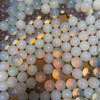Product Description
Opalite Sphere 20 mm small
Mineral Information:
Opalite is a man-made glass material that is often used as a substitute for natural opal in jewelry and decorative items. It is also known by other names such as "sea opal" or "moonstone opal."
Opalite is not a natural gemstone or mineral. It is created by combining dolomite, silica, and other minerals with a resin to produce a glass-like material. The resulting product has a translucent or semi-translucent appearance with a range of colors, including milky white, blue, or yellow.
Opalite is valued for its attractive appearance and iridescent play of colors, which can resemble the play of color seen in natural opal gemstones. It often exhibits a subtle glow or internal luminescence that gives it a mystical and ethereal quality.
Metaphysical Meaning:
Opalite is believed to have a calming and soothing energy. It is thought to enhance communication, especially on a spiritual level, and assist in meditation and spiritual practices. Opalite is sometimes used as a crystal for balancing and harmonizing the chakras.
Mineral Care:
Opalite, being a man-made glass material, is relatively delicate and more fragile compared to natural gemstones or minerals. Here are some reasons why Opalite is considered fragile:
-
Composition: Opalite is primarily composed of glass, which is not as hard or durable as most gemstones. Glass is a non-crystalline material that can be prone to chipping, cracking, or breaking under certain conditions.
-
Hardness: Opalite has a hardness level of approximately 5.5 on the Mohs scale, which measures a mineral's scratch resistance. While it is not extremely soft, it is still relatively softer compared to gemstones like diamonds, sapphires, or rubies. This means that Opalite can be more susceptible to surface scratches or abrasions when it comes into contact with harder materials.
-
Vulnerability to Impact: Opalite can be more vulnerable to impact or forceful blows compared to harder gemstones. Dropping or hitting Opalite against a hard surface can cause it to chip, fracture, or shatter due to its relatively low strength.
-
Thermal Shock: Extreme changes in temperature can pose a risk to Opalite. Glass, including Opalite, is sensitive to rapid temperature fluctuations, which can lead to thermal shock. Sudden exposure to high heat or cold can cause the glass to expand or contract rapidly, potentially resulting in cracking or breakage.
-
Chemical Sensitivity: Opalite is sensitive to harsh chemicals and acidic substances. Contact with chemicals, such as household cleaners, solvents, or acidic liquids, can damage the surface of Opalite or cause it to become dull or discolored.
To maintain the integrity and beauty of Opalite, it is important to handle it with care and take certain precautions:
- Store Opalite jewelry or items separately to avoid contact with harder materials that can cause scratches or damage.
- Avoid exposing Opalite to extreme temperature changes or rapid temperature fluctuations.
- Protect Opalite from impacts or forceful blows that could result in chipping or breakage.
- Clean Opalite gently using mild soap and lukewarm water, avoiding harsh chemicals or abrasive cleaners.
- Remove Opalite jewelry before engaging in activities that may pose a higher risk of damage, such as sports, heavy lifting, or household chores.
Disclaimer:
No information here is intended to diagnose, treat or cure ailments or afflictions of any kind. One should always consult a medical professional if a serious issue presents itself.











